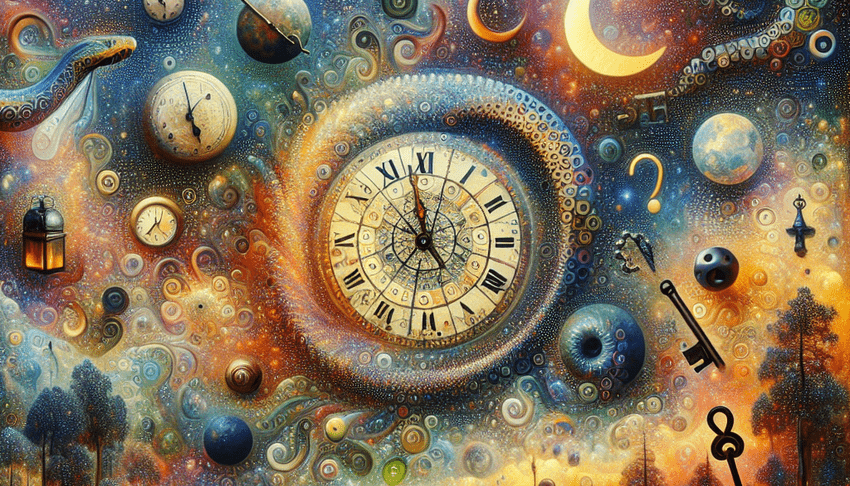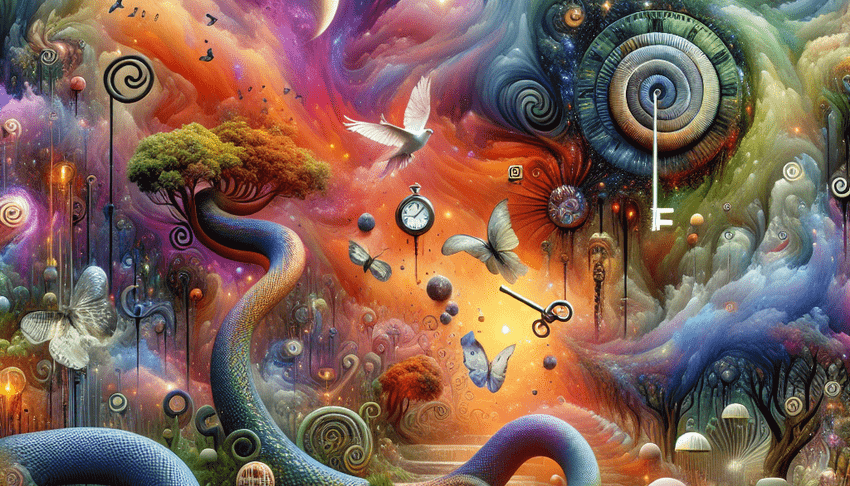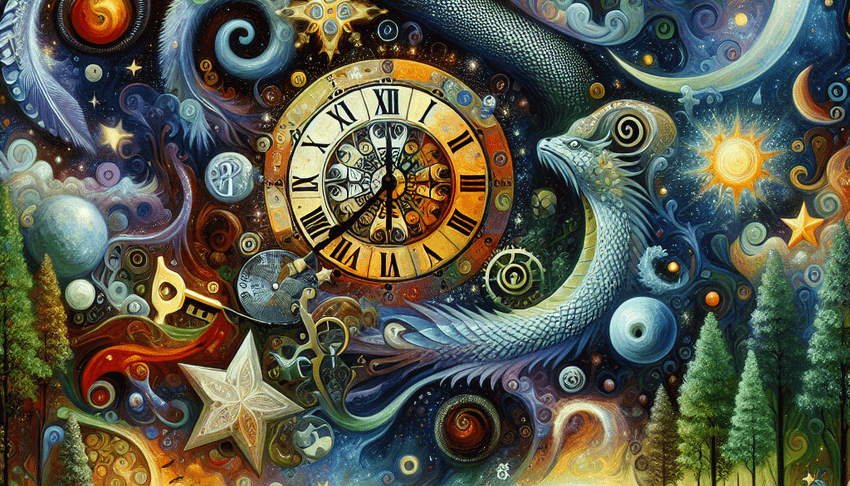Table of Contents
The Language of the Unconscious

The Melody of Dreams
Understanding the significance of music in dreams and the sound symbolism associated with it can offer remarkable insights into our inner world. Interpreting music and sound in dreams becomes a powerful tool in the quest for self-discovery and emotional clarity. The unique rhythms, melodies, and harmonies we encounter while sleeping are not just random firings of the brain; they carry a symbolic weight that echoes through our conscious and subconscious minds.
Emotional States and Melodic Expressions
Music in dreams is often a direct reflection of our emotional wellbeing. When we hear music in our dreams, it’s akin to the soundtrack of our deepest emotions playing out in a sleep-bound concert. Consider the case of Alex, a musician who frequently dreamed of playing powerful, moving symphonies during times of personal victory, but heard disjointed chords in times of stress. This underscores how music and sound in dreams amplify our inner emotional landscapes.
- For those experiencing anxiety, discordant or eerie music might surface in dreams, echoing their emotional distress.
- Conversely, a dream filled with a joyful tune could signify contentment and happiness within.
- A lullaby might be symbolic of a need for rest and rejuvenation, often heard during periods of intense stress or exhaustion.
Sound Symbolism and Interpretation
The interpretation of music in dreams isn’t straightforward and requires an appreciation of sound symbolism. Sound symbolism involves understanding that specific sounds and musical qualities can evoke particular emotions or concepts. For instance, a dream featuring a recurring drumbeat could symbolize a steady approach to life’s challenges or a call to action. Similarly, the rustling of leaves in a dream’s background music might suggest a gentle invitation to change or growth.
- A high-pitched, tinkling piano tune may represent innocence or a delicate situation that the dreamer is facing.
- A powerful brass section might indicate a moment of decisive action or boldness in the dreamer’s life.
- The sound of water, mixed with music, often reflects the flow of emotions or the state of the subconscious.
Practical Applications for Personal Growth
Interpreting music and sound in dreams isn’t merely an academic exercise. It’s a practical tool for enhancing emotional intelligence and promoting mental development. By paying attention to the soundtrack of our dreams, we can uncover hidden feelings, resolve internal conflicts, and even receive insights into our spiritual and emotional needs.
- Documenting dream music and reflecting on its emotional impact can help individuals identify areas of their life that need attention or change.
- Creating playlists of music that resembles dreamt melodies could serve as a therapeutic tool to connect with and process complex emotions during waking hours.
- Professional dream interpreters or therapists can use music from dreams to assist clients in exploring their subconscious and working through emotional barriers.
Dreams are a window into our innermost selves, and the music in dreams acts as a powerful expression of our emotional states and subconscious narratives. Using the melodies and sounds of our dreams, we can better understand ourselves and navigate the pathways of our minds. Through careful study and interpretation, we can transform the nocturnal notes into a symphony of self-awareness and emotional intelligence.
Dissonance and Distress
Interpreting music and sound in dreams can be a profound experience, reflecting our deepest emotions and internal conflicts. Music in dreams often carries significant symbolic weight, and understanding its nuances is essential for dream interpretation and symbolism. When we encounter dissonant, jarring sounds or music in our dreams, it may indicate a form of inner distress or unresolved psychological tension.
Consider the case of Sarah, a dedicated professional experiencing workplace stress. For several nights, Sarah dreamt of a dissonant orchestra, instruments clashing aggressively, creating a cacophony that echoed her daytime anxiety. This type of dream, featuring harsh and discordant sounds, acted as a mirror to her emotional state, pointing to the discord she felt in waking life.
In another instance, John, who was facing a tough decision regarding a personal relationship, reported a recurring dream where a violin played an increasingly discordant tune, symbolizing the growing tension in his life. As the disharmony in the melody escalated, so did his awareness of the need to address his real-life issue.
These examples highlight the significance of discordant sound symbolism in dreams. Such auditory experiences are not random; they often correlate with the inner dissonance one feels. The key to deciphering these symbols lies in making connections between the sound in the dream and the emotions or situations encountered in waking life.
Strong correlations have been found between distressing music in dreams and the dreamers’ emotional states. A study on the emotional impact of music in dreams showed that participants often associated negative soundscapes with feelings of anxiety, fear, or sadness.
- Understanding the dissonance in dream music can often lead to insights into unresolved issues.
- Assessing the emotions tied to these sounds provides a tangible way to gauge one’s subconscious stress levels.
- Addressing these emotions in waking life can frequently lead to more harmonious and peaceful dreams.
In exploring the psychological literature, dream analysts have often stressed the importance of paying attention to the emotional responses evoked by music in dreams. Interpreting music and sound in dreams requires not just an ear for the symbolic meaning of the sounds but also a keen sense for the emotional reactions they provoke in the dreamer.
Dissonance in dreams serves as a signal, urging the dreamer to confront and resolve their internal conflicts. The presence of disturbing music or sounds can uncover emotional distress that might not be fully acknowledged or expressed in waking life. As a result, the interpretation of these dissonant elements can be an integral part of personal growth and emotional self-awareness, ultimately guiding dreamers towards harmony in their waking world.
Emotions and Associations

Soundscapes of Emotion
Dreams are windows into the deepest realms of our subconscious, where the enigmatic language of our inner world unfolds in the form of symbols and sounds. Music in dreams, often a reflection of our emotion states, can reveal layers of meaning about our inner selves. Sound symbolism in our dreams provides a unique auditory dimension to the interpretation of our nocturnal narratives.
Interpreting music and sound in dreams can be similar to deciphering a complex code where each element has a specific resonance with the dreamer’s life. For instance, a person with a strong connection to music might dream of a symphony, with each instrument representing different aspects of their life. The violins could symbolize harmony in their relationships, while the drums may signify a need for assertiveness or action.
Music: A Language of Emotional Processing
Music in dreams often stands out due to its ability to bypass logical thought and directly influence emotions. It’s a form of sound symbolism where melodies and rhythms encapsulate feelings too complex for words. Consider Sarah, whose dream of a thunderous, erratic piano concerto mirrored her internal turmoil amid a tumultuous divorce. Through the expressive power of music, her dream illuminated her emotional landscape that she struggled to articulate while awake.
- Music as an emotional barometer
- Sound as a trigger for memory recollection
- Instrument symbolism and personal associations
Sound Symbolism and Personal Associations
The sounds we hear in dreams are not random; they are laced with symbolism and personal significance. To some, the sound of rain may be soothing, representing renewal or cleansing. To others, it may symbolize sadness or a deluge of overwhelming emotions. Interpreting music and sound in dreams requires us to listen closely to our associations with these sounds.
An analysis of sound symbolism across cultures indicates that there are some universal aspects. For example, lower tones tend to invoke a sense of solemnity or seriousness, just as they might denote something ominous approaching in a dream narrative.
- The subjective nature of sound interpretation
- Cultural influences in sound symbolism
- The universality of certain sound perceptions
Clinical Implications and Therapeutic Uses
Dream interpretation, particularly of music and sounds, has its applications in therapeutic settings. It can be an effective tool in psychotherapy, offering insights into the emotional state of clients. When therapists interpret their clients’ dreams of particular sounds or music, they might better understand the subconscious emotions at play.
For example, the dream where Emma heard her mother’s lullaby could help a therapist grasp her need for comfort and perhaps suggest ways she might seek it in her waking life. Such dreams can be a starting point for discussing unresolved feelings or coping strategies.
- Dreams as avenues for emotional revelation
- Music and sound in dreams as tools for therapy
- Identifying subconscious emotions through sound symbolism
Engaging with the soundscapes of our dreams provides a rich venue for Emotionale Intelligenz and self-discovery. Interpreting music and sound in dreams is not just an intellectual exercise—it’s an exploration of the soul’s symphony, each note holding the potential to reveal the hidden cadences of our inner life.
Personal and Cultural Symbolism
Interpreting music and sound in dreams is a powerful way to delve into our subconscious mind, revealing insights about our emotions, desires, and personal journey. The symbolism of music in dreams often displays a unique tableau that merges both our personal experiences and the broader strokes of cultural significance.
Uncovering Personal Meaning
When exploring music in dreams, sound symbolism is intimately connected to individual narratives. A melody or song that emerges in our dreams can hold significance tied to personal emotions or life events. For instance, the lullaby that a mother once sung may reappear during particularly stressful periods, offering solace and comfort through its familiar tune.
- Understanding individual context is critical to interpreting music and sound in dreams.
- The sound of water, for example, might represent different sentiments depending on one’s life experiences.
- Dreams may use specific songs to underscore emotions such as joy, sadness, or nostalgia.
Cultural Resonance and Collective Memory
Beyond personal memory, the interpretation of music in dreams often draws from cultural connotations and collective memory. A song can represent not just individual emotions but also shared experiences and societal values. It’s these cultural layers that enrich the meaning and add complexity to dream analysis.
- Songs tied to cultural events can evoke feelings of unity or reflection on societal issues.
- Traditional music may indicate a connection to one’s roots or a quest for identity within a larger community.
- National anthems or culturally iconic tunes in dreams might symbolize a collective consciousness or zeitgeist.
Real-Life Example: David’s Dream
The personal and cultural symbolism in dreams came vividly alive in the case of David, a teenager whose dreams often featured the national anthem. The anthem played during a tumultuous period in his life when he was wrestling with questions of identity. For David, hearing the anthem in his dreams fostered a profound emotional response—a stirring mixture of belonging and introspection related to his cultural heritage. The national anthem, a powerful cultural symbol, was woven into his personal narrative, highlighting the dual layers of symbolism that dreams often contain.
By examining both the personal and cultural contexts of music in dreams, we uncover the nuanced interplay between the self and the society in which we live. Music and sound in dreams serve as a bridge, connecting us to our inner worlds and the shared experiences that define us. Interpreting these dream symbols can lead to a deeper understanding of our emotions, thoughts, and identity, providing a rich landscape for personal and mental development.
Summary
Music and sound within our dreams are not mere coincidences but carry profound symbolism that resonates with our emotional and psychological states. The symbolism in dreams, particularly through auditory experiences, provides a unique window into our inner selves, revealing emotions and thoughts we may not fully understand when awake.
Emotional States and Melodic Expressions
Music in dreams reflects our innermost feelings. It can serve as a soundscape to our emotions, where a harmonious melody may indicate peace and contentment, while a cacophony could echo inner turmoil. For instance, a soothing lullaby may symbolize a need for comfort, suggesting a desire for reassurance during stressful times.
- Anxiety might manifest as dissonant music in dreams, indicating emotional unrest.
- Joyful melodies could point to satisfaction and happiness in one’s life.
- Tunes resembling lullabies often emerge during periods of fatigue, hinting at the need for rest.
Sound Symbolism and Interpretation
Sound interpretation goes beyond face value, often requiring a deep dive into sound symbolism, where specific tones and beats carry particular meanings. A repeating drumbeat might signify life’s persistence, while the whisking sounds of leaves can imply a need for change or growth in the dreamer’s life.
- Piano keys tinkling lightly may represent innocence or a delicate situation.
- Brass music could be associated with decisive action or confidence.
- Music blended with water sounds often reflects emotional flow or the state of the subconscious.
Practical Applications for Personal Growth
The practice of interpreting musical dreams can be transformative for emotional intelligence and mental development. Reflecting on dream music can lead to revelations about personal emotional states, aiding in resolving internal conflicts and emotional clarity.
- Analyzing the emotional impact of dream music can pinpoint areas needing attention.
- Crafting playlists that recall dream melodies can assist in processing complex emotions during waking hours.
- Therapists may leverage dreamt music to help clients navigate their emotional depths.
The relationship between dreamt sounds and our emotions is significant, with studies validating these deep connections. Silent moments in dreams can be just as telling as musical ones, sometimes representing a search for tranquility or reflecting a feeling of absence in our waking life.
By tuning into the symphony of dreams, we access a medium that intertwines our cultural influences and individual narratives, offering rich insight into our psyches. Through careful interpretation of dream music and sound symbolism, there is great potential to explore and enhance our understanding of ourselves and our place within society. Engaging with the music of our dreams is not only a scholarly pursuit but a meaningful journey that can enrich our emotional landscapes and invite personal growth.
FAQ – The Symbolism of Music and Sound in Dreams
What can the presence of music or specific sounds in dreams indicate?
The presence of music or specific sounds in dreams can indicate a deep emotional connection to those sounds or the memories and feelings they evoke. For instance, a particular melody may reflect a sense of nostalgia or unfinished emotional business, while repetitive sounds could point to anxiety or a feeling of being stuck in a situation. These auditory elements in dreams often serve as a doorway to our subconscious, revealing our inner emotional landscape and the associations we have with certain aspects of our waking life.
What is the significance of hearing familiar songs or sounds in dreams?
Hearing familiar songs or sounds in dreams can often signify deep emotional connections or triggers related to specific memories and moments from one’s waking life. This auditory phenomenon can serve as an unconscious cue, pulling forth feelings, thoughts, or insights that are intertwined with the particular sounds, indicating the dreamer’s mind is processing or highlighting these associations while they sleep.
What factors contribute to the presence of music or specific sounds in dreams?
Music or specific sounds often appear in dreams as reflections of our emotional states or as echoes of experiences we’ve had while awake. For instance, a song stuck in your head during the day may replay in your dream, or the emotional resonance of a particular piece of music may shape the mood of a dream narrative. Additionally, our brains can integrate sounds from our real-world environment into our dreams, such as an alarm clock beeping or rain tapping at the window, blending reality with the dream world in curious ways.




